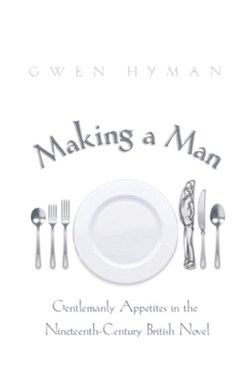-
BROWSE 1000s OF BOOKS IN STOCK
-
FREE DELIVERY ON ORDERS OVER €10
Making a man
PAPERBACK
Categories:
History and criticism
Gruel and truffles, wine and gin, opium and cocaine. Making a Man: Gentlemanly Appetites in the Nineteenth-Century British Novel addresses consumption of food, drink, and drugs in the conspicuously consuming nineteenth century in order to explore the question of what, in fact, makes a man in novels of the period. Gwen Hyman analyzes the rituals of dining room, drawing room, opium den, and cocaine lab, and the ways in which these alimentary behaviors make, unmake, and remake the gentlemanly body. The gentleman, Making a Man argues, is a dangerous alimental force. Threatened with placelessness, he seeks to locate and mark himself through his feasting and fasting. But in doing so, he inevitably threatens to starve, to subsume, to swallow the community around him. The gentleman is at once fundamental and fundamentally threatening to the health of the nation: his alimental monstrousness constitutes the nightmare of the period\u2019s striving, anxious, alimentally fraught middle class. Making a Man makes use of food history and theory, literary criticism, anthropology, gender theory, economics, and social criticism to read gentlemanly consumers from Mr. Woodhouse, the gruel-eater in Jane Austen\u2019s Emma, through the vampire and the men who hunt him in Bram Stoker\u2019s Dracula. Hyman argues that appetite is a crucial means of casting light on the elusive identity of the gentleman, a figure who is the embodiment of power and yet is hardly embodied in Victorian literature.
€31.89

95 Reward Points
In stock online
Extended Range: Delivery in 2-3 working days
Extended Range: Delivery in 2-3 working days
Free Delivery on this item
Any purchases for more than €10 are eligible for free delivery anywhere in the UK or Ireland!
Gruel and truffles, wine and gin, opium and cocaine. Making a Man: Gentlemanly Appetites in the Nineteenth-Century British Novel addresses consumption of food, drink, and drugs in the conspicuously consuming nineteenth century in order to explore the question of what, in fact, makes a man in novels of the period. Gwen Hyman analyzes the rituals of dining room, drawing room, opium den, and cocaine lab, and the ways in which these alimentary behaviors make, unmake, and remake the gentlemanly body. The gentleman, Making a Man argues, is a dangerous alimental force. Threatened with placelessness, he seeks to locate and mark himself through his feasting and fasting. But in doing so, he inevitably threatens to starve, to subsume, to swallow the community around him. The gentleman is at once fundamental and fundamentally threatening to the health of the nation: his alimental monstrousness constitutes the nightmare of the period\u2019s striving, anxious, alimentally fraught middle class. Making a Man makes use of food history and theory, literary criticism, anthropology, gender theory, economics, and social criticism to read gentlemanly consumers from Mr. Woodhouse, the gruel-eater in Jane Austen\u2019s Emma, through the vampire and the men who hunt him in Bram Stoker\u2019s Dracula. Hyman argues that appetite is a crucial means of casting light on the elusive identity of the gentleman, a figure who is the embodiment of power and yet is hardly embodied in Victorian literature.

95 Reward Points
Any purchases for more than €10 are eligible for free delivery anywhere in the UK or Ireland!
€31.89

95 Reward Points
Any purchases for more than €10 are eligible for free delivery anywhere in the UK or Ireland!
Categories:
History and criticism
Product Description
Gruel and truffles, wine and gin, opium and cocaine. Making a Man: Gentlemanly Appetites in the Nineteenth-Century British Novel addresses consumption of food, drink, and drugs in the conspicuously consuming nineteenth century in order to explore the question of what, in fact, makes a man in novels of the period. Gwen Hyman analyzes the rituals of dining room, drawing room, opium den, and cocaine lab, and the ways in which these alimentary behaviors make, unmake, and remake the gentlemanly body. The gentleman, Making a Man argues, is a dangerous alimental force. Threatened with placelessness, he seeks to locate and mark himself through his feasting and fasting. But in doing so, he inevitably threatens to starve, to subsume, to swallow the community around him. The gentleman is at once fundamental and fundamentally threatening to the health of the nation: his alimental monstrousness constitutes the nightmare of the period\u2019s striving, anxious, alimentally fraught middle class. Making a Man makes use of food history and theory, literary criticism, anthropology, gender theory, economics, and social criticism to read gentlemanly consumers from Mr. Woodhouse, the gruel-eater in Jane Austen\u2019s Emma, through the vampire and the men who hunt him in Bram Stoker\u2019s Dracula. Hyman argues that appetite is a crucial means of casting light on the elusive identity of the gentleman, a figure who is the embodiment of power and yet is hardly embodied in Victorian literature.
Product Details
ISBN9780821418543
FormatPAPERBACK
PublisherOHIO UNIVERSITY PRESS (12 May. 2009)
No. of Pages0
Weight446
Language English
Dimensions 229 x 153 x 21

